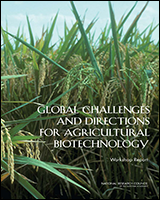NCBI Bookshelf. A service of the National Library of Medicine, National Institutes of Health.
Many developing countries are exploring whether biotechnology has a role in addressing national issues such as food security and environmental remediation, and are considering whether the putative benefits of the technology-for example, enabling greater agricultural productivity and stability in the food supply-outweigh concerns that the technology might pose a danger-to biodiversity, health, and local jobs. Some policy leaders worry that their governments are not prepared to take control of this evolving technology and that introducing it into society would be a risky act. Others have suggested that taking no action carries more risk, given the dire need to produce more food. This book reports on an international workshop held to address these issues. Global Challenges and Directions for Agricultural Biotechnology: Mapping the Course, organized by the National Research Council on October 24-25, 2004, in Washington, DC, focused on the potential applications of biotechnology and what developing countries might consider as they contemplate adopting biotechnology. Presenters at the workshop described applications of biotechnology that are already proving their utility in both developing and developed countries.
Contents
- THE NATIONAL ACADEMIES
- STEERING COMMITTEE ON GLOBAL CHALLENGES AND DIRECTIONS FOR AGRICULTURAL BIOTECHNOLOGY: MAPPING THE COURSE
- BOARD ON AGRICULTURE AND NATURAL RESOURCES
- Preface
- Acknowledgments
- Summary
- 1. Introduction
- 2. Opportunities for Applying Biotechnology
- 3. Challenges and Future Considerations in Realizing the Global Potential of Agricultural Biotechnology
- CHALLENGE 1: DEVELOPING APPROPRIATE AND AFFORDABLE TECHNOLOGIES
- CHALLENGE 2: DETERMINING PRIORITIES FOR BIOTECHNOLOGY
- CHALLENGE 3: ENGAGING THE CITIZENRY
- CHALLENGE 4: BUILDING SCIENTIFIC AND LOCAL CAPACITY
- CHALLENGE 5: DEVELOPING SUSTAINABLE PARTNERSHIPS
- CHALLENGE 6: ENGAGING IN GLOBAL DIALOGUE ON AGREEMENTS AND PROTOCOLS
- CHALLENGE 7: ANTICIPATING FUTURE NEEDS AND DIRECTIONS
- CLOSING THOUGHTS
- References
- Appendix A Steering Committee Biosketches
- Appendix B Workshop Agenda
- Appendix C List of Workshop Participants
NOTICE: The project that is the subject of this report was approved by the Governing Board of the National Research Council, whose members are drawn from the councils of the National Academy of Sciences, the National Academy of Engineering, and the Institute of Medicine. The members of the committee responsible for the report were chosen for their special competences and with regard for appropriate balance.
This workshop was supported by the U.S. Department of State Award No. SLMAQM-03-M-4207 and the National Academies. Any opinions, findings, and conclusions or recommendations in this document are those of the authors and do not necessarily reflect the views of the organizations or agencies that provided support for the project. Mention of trade names, commercial products, or organizations does not constitute their endorsement by the sponsoring agency.
- NLM CatalogRelated NLM Catalog Entries
- Agricultural biotechnologies in developing countries and their possible contribution to food security.[J Biotechnol. 2011]Agricultural biotechnologies in developing countries and their possible contribution to food security.Ruane J, Sonnino A. J Biotechnol. 2011 Dec 20; 156(4):356-63. Epub 2011 Jun 23.
- Review Next biotech plants: new traits, crops, developers and technologies for addressing global challenges.[Crit Rev Biotechnol. 2016]Review Next biotech plants: new traits, crops, developers and technologies for addressing global challenges.Ricroch AE, Hénard-Damave MC. Crit Rev Biotechnol. 2016 Aug; 36(4):675-90. Epub 2015 Feb 2.
- Review Agricultural biotechnology and its contribution to the global knowledge economy.[Adv Biochem Eng Biotechnol. 2007]Review Agricultural biotechnology and its contribution to the global knowledge economy.Aerni P. Adv Biochem Eng Biotechnol. 2007; 107:69-96.
- Review Opportunities for biotechnology and policy regarding mycotoxin issues in international trade.[Int J Food Microbiol. 2007]Review Opportunities for biotechnology and policy regarding mycotoxin issues in international trade.Kendra DF, Dyer RB. Int J Food Microbiol. 2007 Oct 20; 119(1-2):147-51. Epub 2007 Jul 31.
- The attitudes of religious, environmental, and science policy leaders toward biotechnology.[Recomb DNA Tech Bull. 1985]The attitudes of religious, environmental, and science policy leaders toward biotechnology.Miller JD. Recomb DNA Tech Bull. 1985 Dec; 8(4):141-64.
- Global Challenges and Directions for Agricultural BiotechnologyGlobal Challenges and Directions for Agricultural Biotechnology
Your browsing activity is empty.
Activity recording is turned off.
See more...
